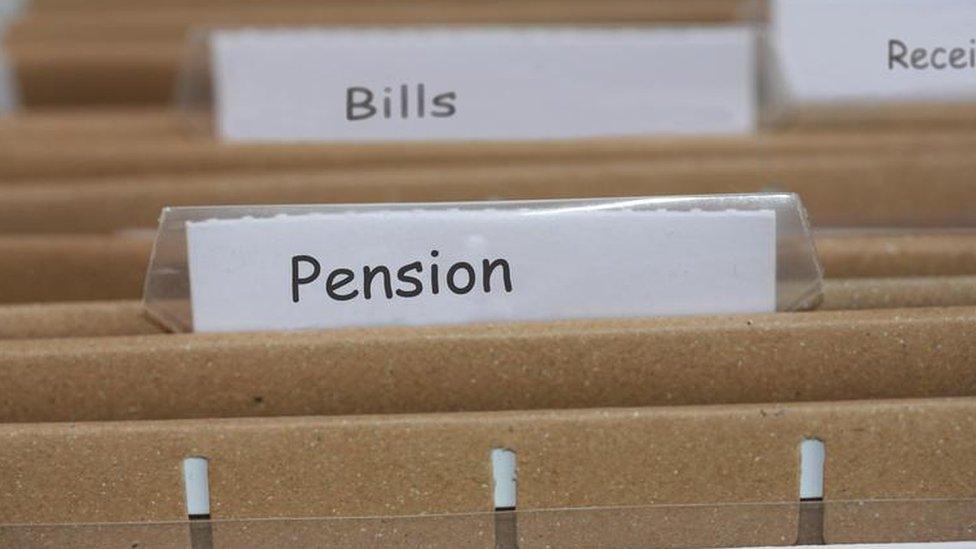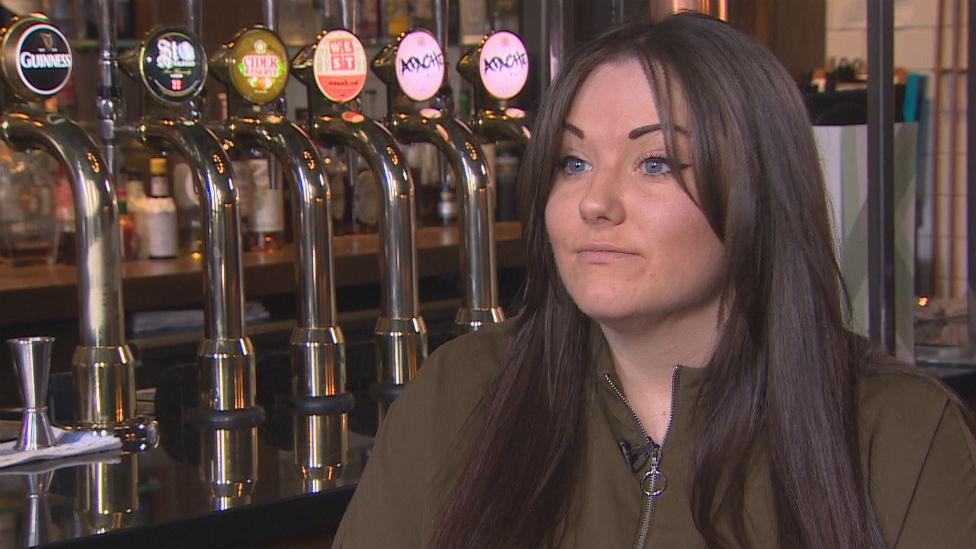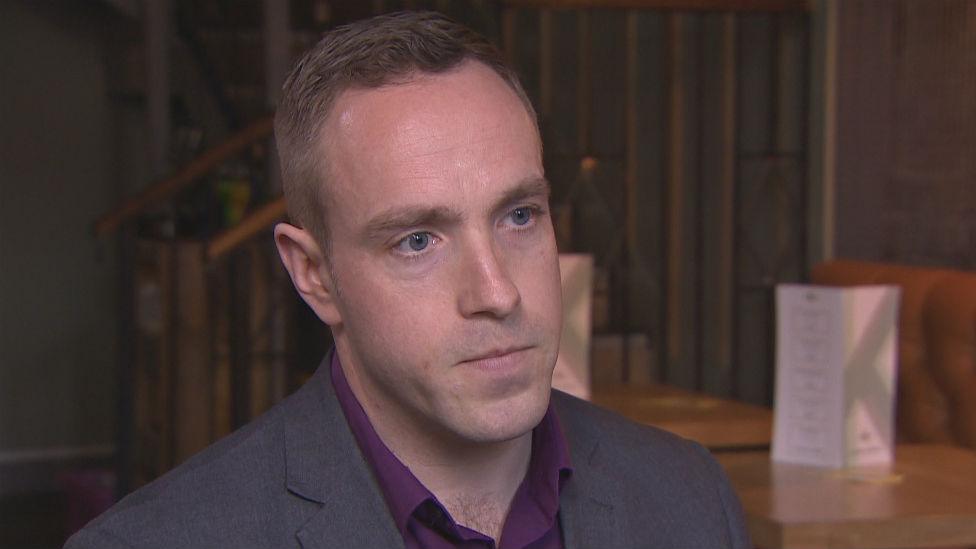Auto-enrolment boosts workplace pension numbers in Scotland
- Published

More than 400,000 people in Scotland are now saving into a workplace pension through auto-enrolment.
The scheme was introduced by the UK government in 2012 to encourage more people to save towards retirement.
Figures from the Department of Work and Pensions showed that in some local authority areas it has doubled the number people with a private pension.
However, some businesses have warned of the rising cost they will have to bear to fund staff pensions in future.
With more people living longer, the UK government wants to ensure that workers save to enable them to top-up their state pension on retirement.
As part of that strategy, it has required most employers to automatically enrol their staff into a pension scheme.
The system - called automatic enrolment - started at the beginning of October 2012 with staff who work for the biggest businesses, and gradually those who work for smaller firms have been signed up in the years since then.
Workers have the right to opt out of the pension - instead of opting in, as used to be the case.
As this scheme has expanded to smaller firms increasing numbers of employees are now saving in this way.

Emily Martin is among those who have a pension as a result of the auto-enrolment system
Emily Martin, an assistant manager at Lebowskis bar and restaurant in Glasgow, is among those who now have a pension as a result of auto-enrolment.
"It's easy to be working shift patterns and planning for the future is quite difficult to do," she said.
"So the idea of someone doing that for you - I wouldn't opt out of that whatsoever.
"I think the biggest thing is knowing that you're going to live out your golden years, and you're not going to get to that stage of your life and realise you're penniless."
She added: "Someone else has thought of it for you. And your contribution to that is something that if you were doing it on your own, you'd maybe never have got round to. So you're covered."
There is a duty on employers to offer their staff a workplace pension through auto-enrolment.
And by requiring them to opt out the scheme aims to "nudge" people into signing up for a pension.
Mo Clark, whose company runs Lebowskis and eight other pubs and restaurants, said all of the people they employed had signed up for the scheme.
"We put in place the process and procedure for auto-enrolment," he said.

Mo Clark said all of his employees have remained within the scheme
"It's all about opting out if they so choose, and our opinion was that we would have some people opting out.
"Because of the nature of the licensed trade and hospitality, staff come and go. But we've been pleasantly surprised. It's been 100% take up. So zero opt-outs."
The so-called nudge at the heart of this pension scheme, seems to have encouraged more people to opt in.
And by the end of this year those who are part of the scheme will get another "nudge" - to save more through higher pension contributions.
But that is a concern for Colin Borland of the Federation of Small businesses.
He said: "The employer minimum contribution begins at 1%, but it rises steadily over the next couple of years till it gets to 3%, with 5% for the employee - making 8% of salary in total.
"That money has to be found from somewhere. And if you have a dozen staff or so, then its significant.
"But I think the impact goes beyond simple cost. When we asked them, three in four of our businesses said auto-enrolment put an awful lot of pressure - in fact too much pressure - on businesses like theirs. "
Wider scope
Five years after it was set up, this scheme is now being applied to the UK's smallest firms and by the time it is complete most workers in Scotland will have a workplace pension. But not everyone in the workforce is covered.
Jamie Jenkins, head of pensions strategy at Standard Life, said: "At the moment self-employed people are not included.
"Across the UK there are almost five million people who are self-employed - and that includes people in the "gig" economy. They're not covered by auto-enrolment.
"We also have people on lower earnings, people who're under the age of 22, and people who perhaps have multiple jobs. So there are some quite large populations who we still need to consider bringing in to that auto-enrolment scope."
UK Minister for Pensions Richard Harrington said: "For most of us, if we want to continue to do the things we enjoy in retirement, a workplace or personal pension is something we'll need.
"That's why I am particularly pleased to see 400,000 people in Scotland saving for their retirement thanks to automatic enrolment.
"When it comes to saving my advice is start off small and build it up - even if you can only afford to put a bit in at first it can all add up over time.
"This year many more small employers will see their workplace pensions duties start and my message to them is clear: don't be daunted, there is help and support out there."

How people are 'nudged' into workplace pensions
Until now, it's been hard to persuade people to save for their retirement. It's so easy to put off.
We all know why. The paperwork's boring and complex. We tend to wait decades to feel the benefit. Will we live that long? Would we prefer a holiday this summer instead? Or a new sofa now? Choices, choices. All tend to put us off.
But 441,000 Scots now have a new workplace pension, thanks to auto-enrolment. So it's worth looking at how it's overcome our natural inertia so effectively.
It seems it's down to "nudge" theory, a new government tactic, inspired by "behavioural economics".
A nudge is small and simple. That's its beauty. Few of us mind being nudged into doing "the right thing".
So when it comes to retirement, workers are simply nudged into joining a workplace pension scheme. They have one month to opt out. If they don't, they're signed up.
There's freedom to leave, but who would choose to? It's all in a good cause. And after a while, they're nudged to increase the amount they save for their retirement. It's simple and relatively painless.
Nudge theory is now used in a lots of different settings. Bags of fruit next to the checkouts nudge us to buy healthy snacks.
Some fast food outlets write the buyer's name on the bag - which can nudge us not to drop litter on the way home. Who'd leave their name on the evidence, after all?
Increasing organ donation, and encouraging people to pay their road tax can also get a boost, with just a little nudge.
- Published20 February 2017

- Published27 July 2016

- Published12 January 2016

- Published8 August 2013
